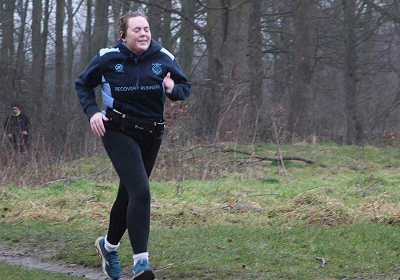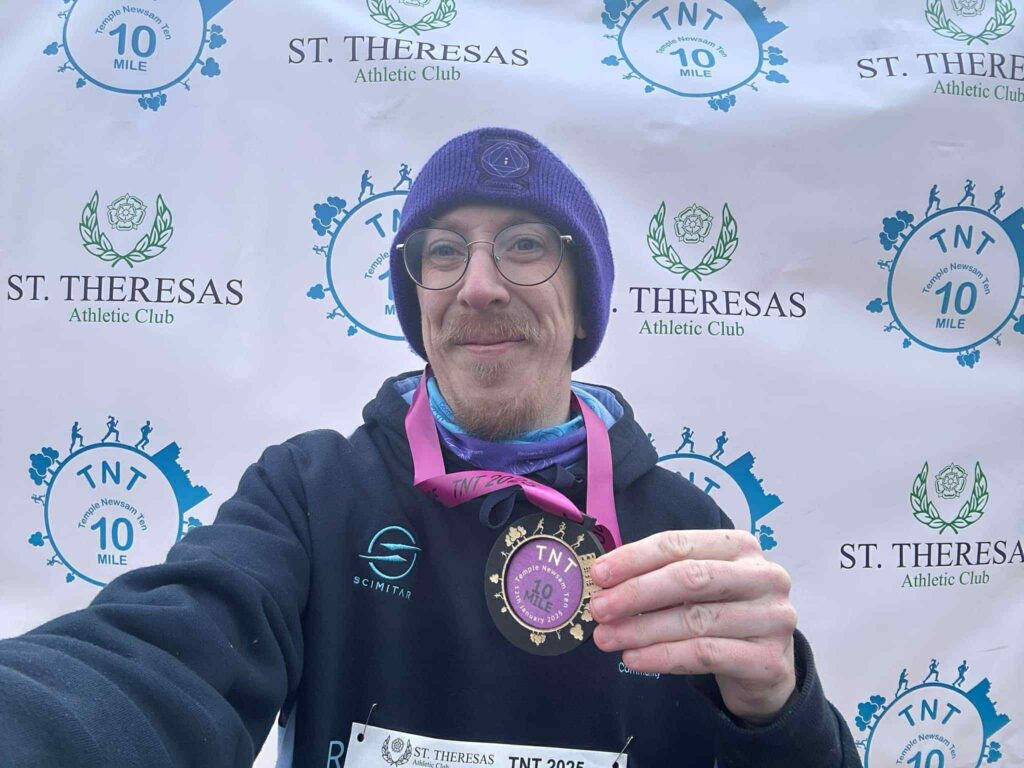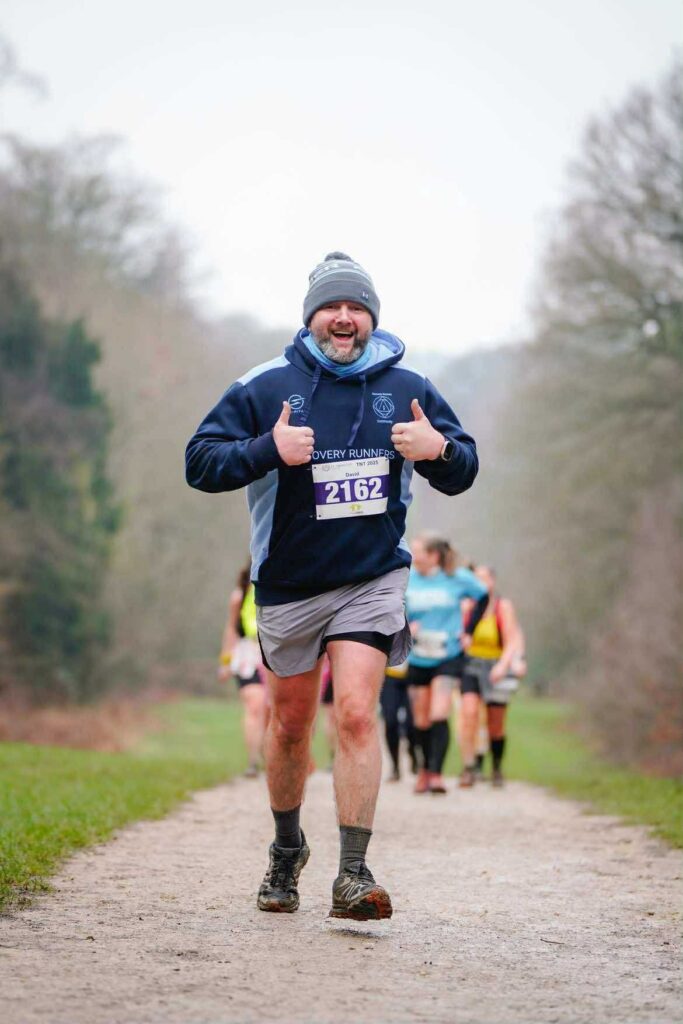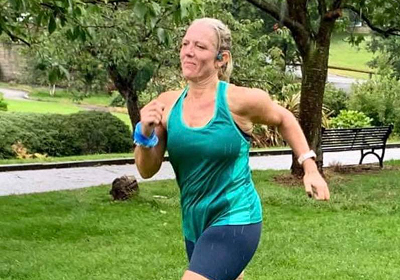When Charlotte Kemp first discovered Recovery Runners, she was standing at a crossroads. Life had become almost unmanageable: she was battling severe depression, had gained significant weight after the pandemic, and describes her mental health at that point as “ready to give up.” Caught in a destructive cycle of drinking, unhealthy eating, and isolation, Charlotte’s future felt frighteningly uncertain.
“I was suicidal. Life didn’t feel worth living,” Charlotte recalls. “The only friends I had were drinkers and people who encouraged me to do bad things. Every weekend was just going out, getting smashed, and then eating badly. I was just on a path of self-destruction.”
Her struggles with weight had started in her teenage years, when she developed bulimia at just 15. Over time, her body fluctuated between extremes, ranging from a size 4 to a size 26. After a miscarriage early in her relationship with her partner Marcus, Charlotte’s mental health worsened, and during the long months of lockdown her anxiety, weight gain, and low self-esteem escalated. At her lowest point, she struggled even to walk one kilometre without needing to stop in pain.
It was around this time that a friend, Katie, suggested Recovery Runners. She reassured Charlotte that Dean and Jamie, the group’s founders, would welcome her without judgement. Nervously, Charlotte attended her first session. What she found was not just a running club, but a safe space filled with encouragement, understanding, and a new way of life.
“Without Recovery Runners, I would be dead,” Charlotte says firmly. “It started as a weight-loss journey, but then I found healthier ways to live. I learned that weekends didn’t have to revolve around pubs and drinking. I’ve met amazing friends who I spend time with- whether it’s walking, social events without alcohol, or just supporting each other. Running has become almost secondary to the change in mindset and lifestyle they’ve given me.”
For the first time in years, Charlotte felt part of a community that understood her struggles and encouraged her growth. Small victories- like finishing a 5K or saying no to alcohol on a night out- became stepping stones to bigger changes. The friendships she made within Recovery Runners showed her that there was a healthier, happier way forward.
But just as Charlotte was regaining her footing, her world was shaken by unimaginable tragedy. Marcus, her partner of 13 years, who had also joined Recovery Runners to support his mental health, died following a mental health crisis. Although the official cause of death was recorded as a fall, Charlotte explains that Marcus had attempted to take his own life before changing his mind too late.
“It was the loneliest I’ve ever felt in my life,” Charlotte says. “We were probably the happiest we’d ever been, so I was completely blindsided. I’ll never forget sitting by his side in hospital and holding him as he passed away. It shattered me.”
In the months that followed, Charlotte leaned on running as her therapy. Strapping on her trainers, plugging in her headphones, and hitting the pavement became her outlet for grief and pain. “Running has saved me. Without it, I would have turned back to destructive choices,” she explains. “It’s kept me going when I’ve wanted to give up.”
To honour Marcus, Charlotte began dedicating her runs to him. On his birthday, she ran 15 miles without training, powered only by determination and love. On the anniversary of his death, she attempted to run 34 miles- completing 28 before exhaustion and injury forced her to stop. “My mantra has become ‘one life for the two of us,’” Charlotte says. “Every small act of self-care- whether it’s brushing my hair, keeping my home tidy, or going for a run- feels like a shared victory for both of us.”
Beyond running, Charlotte honours Marcus by carrying forward his small but meaningful habits. He had managed restaurants and always made a point of clearing tables or tipping generously. Now, Charlotte does the same, seeing it as a way to keep his memory alive through everyday kindness.
Grief, however, is unpredictable. Charlotte admits to ongoing struggles with fatigue, loneliness, and depressive spirals. Certain triggers- such as anniversaries, medical emergencies at work, or even walking into a supermarket- can plunge her back into deep pain. She has attempted suicide once since Marcus’s death and continues to receive psychiatric support.
Yet she is not facing these challenges alone. Alongside Recovery Runners, Charlotte has found another vital support system in Widowed and Young (WAY), a peer network for people under 55 who have lost a partner. Through WAY, she has connected with others who share her experiences and has described the group as “a lifesaver.” In September, she takes on the Great North Run to raise funds for the charity, giving back to a community that has given her strength.
Looking forward, Charlotte is determined to rebuild her running routine. She has committed to attending Wednesday sessions with Rothwell Harriers, park runs on Saturdays, and her beloved Recovery Runners on Sundays- ensuring at least three social runs each week, alongside her solo sessions.
Charlotte’s story is not a simple tale of struggle and recovery- it is one of resilience, community, and hope in the face of devastating loss. By sharing her journey, she hopes others will see that it is possible to rebuild even when life feels impossible. “Recovery Runners hasn’t just given me running,” she reflects. “It’s given me friendship, purpose, and the reason I’m still here today.”



